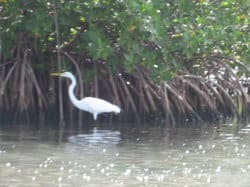
Beginning on May 21, National Park Service (NPS) contractors will continue a park project to restore native plant communities on the east side of Salt River Bay NHP & EP (SARI). The project is on NPS’s 72-acre parcel adjacent to Estate Judith’s Fancy where invasive non-native plant species’ populations cover over 75-80 percent of the area.
Discarded landscape plants and cuttings from surrounding areas have invaded the parcel over the last 50+ years. In 2012, NPS, US Fish & Wildlife Service, Florida Caribbean Exotic Plant Management Team and NPS Youth Conservation Corps high school students initiated exotic plant control in the park and began native plant restoration. With contractor support, NPS will continue to control targeted invasive non-native plants that displace native plant species and alter plant community diversity. These species alter nutrient and fire patterns, modify geomorphology, hydrology and biogeochemistry, and they reduce the site’s recreational uses.
To date, NPS has planted over 1200 native plants grown locally into the parklands on the east side of the bay. The plant survivorship is between 40 and 60 percent, and many of the trees have grown to over 20 feet tall. However, these trees continue to be crowded out by non-native invasive African guinea grass. Over the next few weeks, an NPS contractor will target non-native plants such as guinea grass, tan-tan and rubber vine or purple allamanda, throughout the previously disturbed landscape. More native trees and shrubs will be planted to improve erosion control and plant diversity in the coastal area.
NPS is committed to maintaining and enhancing the natural and cultural resources of Salt River Bay. It continues its invasive non-native plant maintenance program to ensure these nuisance species do not re-establish, and that native species are protected and the habitat improved for plants, fruits, wildlife and recreational uses of the landscape.
The immediate goals of control / management of invasive non-native plants are:
• Manage and reduce the populations of invasive non-native plants found on NPS lands within SARI.
• Improve conditions for native flora and fauna, improve recreational uses, and reduce fire threat in tall non-native grasses.
•Increase the public and territorial conservation agencies’ awareness of environmentally sound management practices and the potential threats from invasive non-native plant species.
• Work with park neighbors to control continued introduction of invasive non-native plants to the park.
Details of plant control targets and target plant out species are in the project’s Environmental Impact Statement: http://parkplanning.nps.gov/document.cfm?
http://www.epa.gov/pesticides/reregistration/REDs/factsheets/0178fact.pdf
Additional information regarding herbicide use can be found at the following links: The EPA has completed their review of the comments on the re-registration of glyphosate. They have re-affirmed the agency stance and put forth an interim decision for public comment. It looks like they will be updating the label with regards to ecological impacts. You can find the press release here:
https://www.epa.gov/newsreleases/epa-takes-next-step-review-process-herbicide-glyphosate-reaffirms-no-risk-public-health
For further information, contact Clayton Pollock, biologist, at 773-1460, ext. 238; Zandy Hillis-Starr, chief resource management, at 773-1460, ext. 235; or Brian Lockwood, Florida/Caribbean exotic plant management team liaison, at 786-249-0073.





